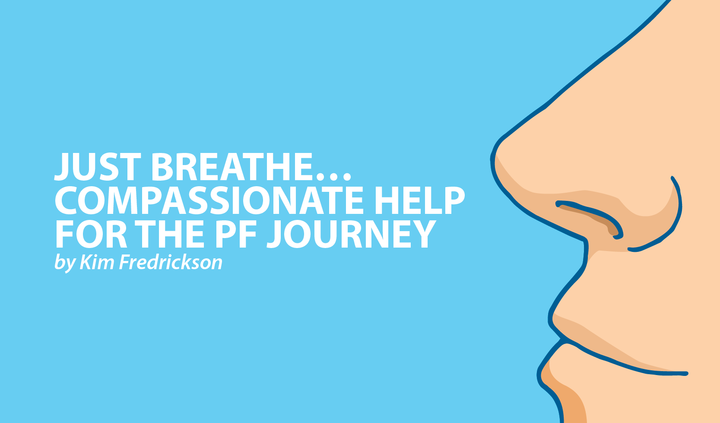How to Decide When to Stop Working
Written by |

As PF progresses, it is wise to address how long to keep working. It is common to wonder: How do I know when to stop? When is work harmful to my health? Can I make it financially? How do I obtain disability or early retirement?
These are all normal questions. Even if not employed full-time, we need to look at the activities we used to do and ask similar questions.
Before my PF diagnosis, I worked full time as a marriage and family therapist. I loved my job and didn’t want to stop. At first, I only needed supplemental oxygen when walking and could meet with my clients without using the assistance. After about a year of PF progression, I needed to use my portable oxygen concentrator during client sessions. The noise of the concentrator was very distracting to me, though my clients seemed fine with it.
As I worsened, my oxygen needs increased and my concentrator could no longer produce the amount of oxygen I needed to walk down the hall to the waiting room to greet my clients. At that point, I realized I needed to stop working. It was wearing me out and I was finally emotionally ready to leave.
Many things to consider:
Making the decision to stop working is complicated. It’s helpful to ask yourself some questions:
- Is working wearing me down?
- Can I apply for long-term disability (in the U.S.) or ill-health early retirement (in the U.K.)? How much income will I bring home?
- What other sources of income do I or family members have?
- What signs will tell me it is time?
- Is working taking precious time and energy I could use to take care of myself and live life more fully?
- Do I want to work until the end, or do I want to enjoy retirement and time with my loved ones?
- Is refusing to stop working a way to deny my illness’ seriousness?
We all wrestle with realizing the right time to stop working. It is a tough decision, especially financially. Most patients I know, including myself, feel they stopped working too late. I worked at least six months longer than I should have, which contributed to my disease worsening at a faster rate. Of course, hindsight is 20-20.
Study your answers to the above questions. Discuss different possibilities with your spouse and loved ones. Talk to your employer to see if working part time is a possibility. Check out the amount you would receive financially with early retirement. Crunch the numbers and see if you can retire soon. The time you have left is precious, and you deserve to make the most of the time you have left to live.
I’d love to hear from you
Have you stopped working? What convinced you it was time to stop? If you haven’t stopped, what are you wrestling with?
Please leave a comment below and share with those who could benefit via email or on social media.
***
Note: Pulmonary Fibrosis News is strictly a news and information website about the disease. It does not provide medical advice, diagnosis, or treatment. This content is not intended to be a substitute for professional medical advice, diagnosis, or treatment. Always seek the advice of your physician or other qualified health provider with any questions you may have regarding a medical condition. Never disregard professional medical advice or delay in seeking it because of something you have read on this website. The opinions expressed in this column are not those of Pulmonary Fibrosis News or its parent company, Bionews Services, and are intended to spark discussion about issues pertaining to pulmonary fibrosis.








Dale Darling
I am 72 and still working. I have and easy job is sales and warehouse work. I have had this disease for almost 6 years now. It has worsened some in the last 8 months to the point where my doctor got me started as Esbriet for almost three months now. I don't do a lot of stressful work anymore at work or home and enjoy my customers which I have had for 30 years or so. My concern is if I quit working will I be able to pick up a Medicare Insurance Co that will cover Esbriet ? I enjoy going to work as my son is my boss and understands my condition, and when I get home in the late afternoon my energy level is way low and I can't do much around the house and the wife helps a lot. I was just started Pulmonary Rehab, will see if that helps any. Two of the Doctors I am seeing recommend it, so I felt I must give a try.
Kim Fredrickson
Hi Dale,
Thanks for your comment. So glad you are enjoying your job and customers. What a blessing! Good question about Medicare. You should be in it now. If Medicare pays for it now, they will pay for it when you stop working. Talk to Medicare about this to make sure. Pulmonary rehab is great! I also just started a program you can do at home too. Check it out at PulmonaryWellnessOnline.com Best Wishes to you!
Michelle Harms
I am wrestling with this very issue right now. I feel my employer is super juding me now that I have oxygen 24/7. I know they can not fire me for the oxygen, but I feel like they are nit picking me now to find grounds to not offer me the contract again next year. SO I am considering all my options. Do I get my application started for disability as everyone assures me they will deny me the first time for sure? Do I wait? I really need the insurance coverage more than the paycheck as sad as that sounds. I have double coverage luckily. I am on my husbands plan, which we pay for as his is covered by his company and I get mine free from the school district I work for. With 2 policies, almost everything is covered at 100% so I am super blessed. Am I going to be able to find another full time job that will hire me with the oxygen? And the biggest thing is I have all of this and only drive 3 blocks to work every day. I only work Monday-Friday 7:40 AM to 3:50 PM and don't work when it is slick outside, I have a week at Thanksgiving, 2 1/2 weeks off at Christmas, and 3 months off in the summers. I get to work with at risk youth that I absolutely love. How am I going to fill my days if I quit work? I don't want to just sit at home and get more depressed being alone all day.The one thing I have learned so far, there are no easy answers. I look forward to any insight anyone can offer.
Kim Fredrickson
Hi Michelle,
Thanks for sharing how you are wrestling with this decision right now. I'm so glad you have a job you love and are making a difference in your world. Just a few things to consider. I would get a consultation with an attorney who specializes in employment law to get their legal opinion. In order to apply to disability your doctor will need to sign a form that says you can no longer work. If the time comes you have to stop work you will be able to get short term disability from your state. Not sure if your insurance will continue. When the time comes to apply for social security disability, you most likely won't get turned down. PF is one of the diagnoses included in "The Compassionate Allowances (CAL) initiative" This is a way to expedite the processing of SSDI and SSI disability claims for applicants whose medical conditions are so severe that their conditions obviously meet Social Security’s definition of disability. Here's a link to learn more https://www.ssa.gov/compassionateallowances/index.htm I hope this is a help. You are asking yourself great questions. Many blessings to you.
Beth
I have a family member that just was diagnosed with early pf. She has an inhaler and medicine but is looking to go on medical disability as a couselor. She says she has frequent broncitis too and that's was caused the pf. She's also looking into getting ssdi.
She's only 56. Can this progress quickly?
Maureen Holmes
I have PF diagnosed 2019 i feel it is getting worse i have had a few panic attacks which are frightening i have lost days at work coz of them i am considering leaving my job i just don't know what to do i no in time it will get worse i need advice on what to and how to deal with it would counseling help
Tim Ortiz
FedLoan will discharge your student loans if you are on disability
Tim Ortiz
for panic attacks you can use a physical reflex counter manuever. You will be applying pressure on your left arm place your right thumb on the inside of your arm right above where a watch wristband would be place your right index and middle finger on the outside of your arm directly across your thumb. pinch very hard while the panic attack occurs and hold until it subsides.